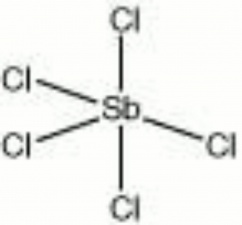Difference between revisions of "Antimony pentachloride"
Jump to navigation
Jump to search
(username removed) |
|||
| (3 intermediate revisions by 3 users not shown) | |||
| Line 1: | Line 1: | ||
== Description == | == Description == | ||
| − | A yellow, oily liquid with a putrid smell. Antimony pentachloride is used as a [ | + | A yellow, oily liquid with a putrid smell. Antimony pentachloride is used as a [[stain|stain]] for materials containing hydroxyl groups such as [[dammar|dammar]], [[mastic|mastic]], [[sterol|sterols]], [[nondrying%20oil|nondrying oils]], and [[vitamin|vitamins]]. It reacts to form an adduct that fluoresces blue-white in [[ultraviolet%20light|ultraviolet light]]. Antimony pentachloride is moisture sensitive and will decompose in the presence of [[water|water]] or [[alcohol|alcohols]]. |
| − | + | [[[SliderGallery rightalign|antimony pentachloride.jpg~Chemical structure]]] | |
== Synonyms and Related Terms == | == Synonyms and Related Terms == | ||
APC; antimony perchloride | APC; antimony perchloride | ||
| − | + | == Hazards and Safety == | |
| − | == | + | * Corrosive, fumes in moist air. |
| + | * Reacts strongly with organics. | ||
| + | * Highly toxic. Will damage skin and membranes on contact. | ||
| + | * Fisher Scientific: [https://www.fishersci.com/store/msds?partNumber=AC201210500&productDescription=ANTIMONY%28V%29-PENTACHLORID+50GR&vendorId=VN00032119&countryCode=US&language=en SDS] | ||
| − | + | == Physical and Chemical Properties == | |
| − | Maximum absorption wavelength= 430 nm; Maximum emission wavelength= 550 nm. | + | * Soluble in hydrochloric acid, chloroform, carbon tetrachloride. |
| + | * Hydrolyzes in water to form solid Sb2O5. | ||
| + | * Maximum absorption wavelength= 430 nm; | ||
| + | * Maximum emission wavelength= 550 nm. | ||
{| class="wikitable" | {| class="wikitable" | ||
| Line 24: | Line 30: | ||
|- | |- | ||
! scope="row"| Melting Point | ! scope="row"| Melting Point | ||
| − | | 2.8-3.5 | + | | 2.8-3.5 C |
|- | |- | ||
! scope="row"| Density | ! scope="row"| Density | ||
| − | | 2.34 | + | | 2.34 g/ml |
|- | |- | ||
! scope="row"| Molecular Weight | ! scope="row"| Molecular Weight | ||
| Line 33: | Line 39: | ||
|- | |- | ||
! scope="row"| Boiling Point | ! scope="row"| Boiling Point | ||
| − | | 77 (dec) | + | | 77 C (dec) |
|} | |} | ||
| − | == | + | ==Resources and Citations== |
| − | |||
| − | |||
| − | |||
| − | |||
| − | |||
| − | |||
| − | |||
| − | |||
| − | |||
| − | |||
| − | |||
| − | |||
| − | * | + | * Richard S. Lewis, ''Hawley's Condensed Chemical Dictionary'', Van Nostrand Reinhold, New York, 10th ed., 1993 |
| − | * | + | * Richard C. Wolbers, Nanette T. Sterman, Chris Stavroudis, ''Notes for Workshop on New Methods in the Cleaning of Paintings'', J.Paul Getty Trust, Los Angeles, 1990 |
* ''The Merck Index'', Martha Windholz (ed.), Merck Research Labs, Rahway NJ, 10th edition, 1983 Comment: entry 736 | * ''The Merck Index'', Martha Windholz (ed.), Merck Research Labs, Rahway NJ, 10th edition, 1983 Comment: entry 736 | ||
Latest revision as of 13:25, 27 April 2022
Description
A yellow, oily liquid with a putrid smell. Antimony pentachloride is used as a Stain for materials containing hydroxyl groups such as Dammar, Mastic, sterols, nondrying oils, and vitamins. It reacts to form an adduct that fluoresces blue-white in Ultraviolet light. Antimony pentachloride is moisture sensitive and will decompose in the presence of Water or alcohols.
Synonyms and Related Terms
APC; antimony perchloride
Hazards and Safety
- Corrosive, fumes in moist air.
- Reacts strongly with organics.
- Highly toxic. Will damage skin and membranes on contact.
- Fisher Scientific: SDS
Physical and Chemical Properties
- Soluble in hydrochloric acid, chloroform, carbon tetrachloride.
- Hydrolyzes in water to form solid Sb2O5.
- Maximum absorption wavelength= 430 nm;
- Maximum emission wavelength= 550 nm.
| Composition | SbCl5 |
|---|---|
| CAS | 7647-18-9 |
| Melting Point | 2.8-3.5 C |
| Density | 2.34 g/ml |
| Molecular Weight | mol. wt. = 299.02 |
| Boiling Point | 77 C (dec) |
Resources and Citations
- Richard S. Lewis, Hawley's Condensed Chemical Dictionary, Van Nostrand Reinhold, New York, 10th ed., 1993
- Richard C. Wolbers, Nanette T. Sterman, Chris Stavroudis, Notes for Workshop on New Methods in the Cleaning of Paintings, J.Paul Getty Trust, Los Angeles, 1990
- The Merck Index, Martha Windholz (ed.), Merck Research Labs, Rahway NJ, 10th edition, 1983 Comment: entry 736
